| Srl | Item |
| 1 |
ID:
187388
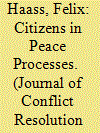

|
|
|
|
|
| Summary/Abstract |
Citizen engagement in and support for peace processes have been deemed important for sustainable peace after civil wars. Yet much of what we know about peace processes in civil wars centers on the interests of elite actors. This special feature aims to advance a research agenda focusing on citizens in peace processes to address this mismatch. In the introduction to the special feature, we first present empirical evidence situating citizens in relation to civil war peace processes. We then trace the current state of the literature on the roles of citizens in peace processes. Following that, we introduce a conceptual framework designed to improve scholarly analysis of the political behavior of citizens in peace processes. We also locate the individual contributions to the special feature within the framework in order to demonstrate its utility and as a means of helping to identify directions for future research.
|
|
|
|
|
|
|
|
|
|
|
|
|
|
|
|
| 2 |
ID:
148763
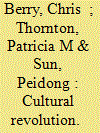

|
|
|
| 3 |
ID:
095278
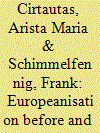

|
|
|
|
|
| Publication |
2010.
|
| Summary/Abstract |
This introductory essay reviews the literature on historical legacies in the post-communist area and relates it to the study of enlargement and Europeanisation. The authors develop a framework for the special section, specify various ways in which historical legacies can be conceived of affecting conditionality and compliance, give an overview of the contributions and summarise the findings.
|
|
|
|
|
|
|
|
|
|
|
|
|
|
|
|
| 4 |
ID:
095279
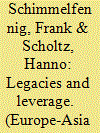

|
|
|
|
|
| Publication |
2010.
|
| Summary/Abstract |
Previous studies have established strong and robust effects of EU political conditionality on democracy in the neighbouring countries. We test these effects against the claim that historical legacies condition the likelihood of successful democratisation-and possibly the EU's political conditionality as well. Based on a panel study of 36 countries of the Eastern and Mediterranean neighbourhood of the EU between 1988 and 2004, we show that cultural legacies of religious civilisation are indeed conducive to or inhibit democratisation, and reduce the effects of political conditionality, but they do not explain away the EU's role in promoting democratic consolidation.
|
|
|
|
|
|
|
|
|
|
|
|
|
|
|
|
| 5 |
ID:
123106
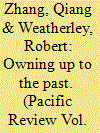

|
|
|
|
|
| Publication |
2013.
|
| Summary/Abstract |
This article examines the emergence of an increasingly vociferous public debate in China over the true contribution made by the KMT in the war against Japan. Following years of rigid adherence to the traditional Maoist line that the CCP won the war almost single-handedly, the party has finally moved towards a more realistic and honest assessment that recognises the pivotal role played by the KMT in defeating the Japanese. The rationale for conceding this point is ultimately linked to the question of nationalist legitimacy. At a time of increasing socio-economic uncertainty and in an effort to fill the ideological void left by the demise of Chinese Marxism, the party is trying hard to bolster its nationalist credentials. One way that it is doing this is by presenting a united patriotic front on the war against Japan, with itself at the helm. However, things have not materialised in the way the party had anticipated. Along with strong expressions of national pride in China's war effort, some members of the public have responded with sympathy towards the KMT veterans who fought the Japanese. With this sympathy has come antipathy towards the CCP who are accused of persecuting KMT soldiers after 1949, of re-writing the history of the war for its own propaganda purposes and of betraying the nation by, amongst other things, avoiding armed conflict with Japan and leaving the KMT to fight the war on its own. In light of this growing (although not necessarily majority) public reaction, we argue that instead of fortifying the party's nationalist legitimacy, the official reappraisal of the KMT's role in the war runs the risk of eroding that legitimacy.
|
|
|
|
|
|
|
|
|
|
|
|
|
|
|
|
| 6 |
ID:
094556
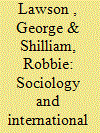

|
|
|
|
|
| Publication |
2010.
|
| Summary/Abstract |
While sociological concepts have often been implicitly used in International Relations (IR), recent years have seen a more explicit engagement between IR and Sociology. As with any such interdisciplinary assignation, there are both possibilities and challenges contained within this move: possibilities in terms of reducing IR's intellectual autism and opening the discipline towards potentially fertile terrain that was never, actually, that distant; challenges in that interdisciplinary raiding parties can often serve as pseudonyms for cannibalism, shallowness and dilettantism. This forum reviews the sociological turn in IR and interrogates it from a novel vantage point-how sociologists themselves approach IR concepts, debates and issues. Three sociological approaches-classical social theory, historical sociology and Foucauldian analysis-are critically deployed to illuminate IR concerns. In this way, the forum offers the possibility of (re)establishing exchanges between the two disciplines premised on a firmer grasp of social theory itself. The result is a potentially more fruitful sociological turn, one with significant benefits for IR as a whole.
|
|
|
|
|
|
|
|
|
|
|
|
|
|
|
|
| 7 |
ID:
134195
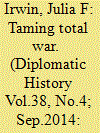

|
|
|
|
|
| Publication |
2014.
|
| Summary/Abstract |
This essay examines the history of American humanitarianism in the First World War and its aftermath. It analyzes both the diplomatic and cultural significance of humanitarianism to U.S. foreign affairs. It also considers the legacies of Great War-era relief.
|
|
|
|
|
|
|
|
|
|
|
|
|
|
|
|
| 8 |
ID:
140789
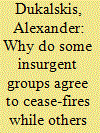

|
|
|
|
|
| Summary/Abstract |
This article uses Burma/Myanmar from 1948 to 2011 as a within-case context to explore why some armed insurgent groups agree to cease-fires while others do not. Analyzing 33 armed groups it finds that longer-lived groups were less likely to agree to cease-fires with the military government between 1989 and 2011. The article uses this within-case variation to understand what characteristics would make an insurgent group more or less likely to agree to a cease-fire. The article identifies four armed groups for more in-depth qualitative analysis to understand the roles of the administration of territory, ideology, and legacies of distrust with the state as drivers of the decision to agree to or reject a cease-fire.
|
|
|
|
|
|
|
|
|
|
|
|
|
|
|
|
| 9 |
ID:
134196
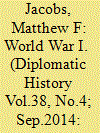

|
|
|
|
|
| Publication |
2014.
|
| Summary/Abstract |
This article emphasizes four major transformations that World War I either initiated or accelerated in the Middle East: (1) foreign involvement; (2) the creation of the Middle Eastern state system; (3) the emergence of explicitly more nationalist politics; and (4) the rise of the Middle Eastern oil industry.
|
|
|
|
|
|
|
|
|
|
|
|
|
|
|
|